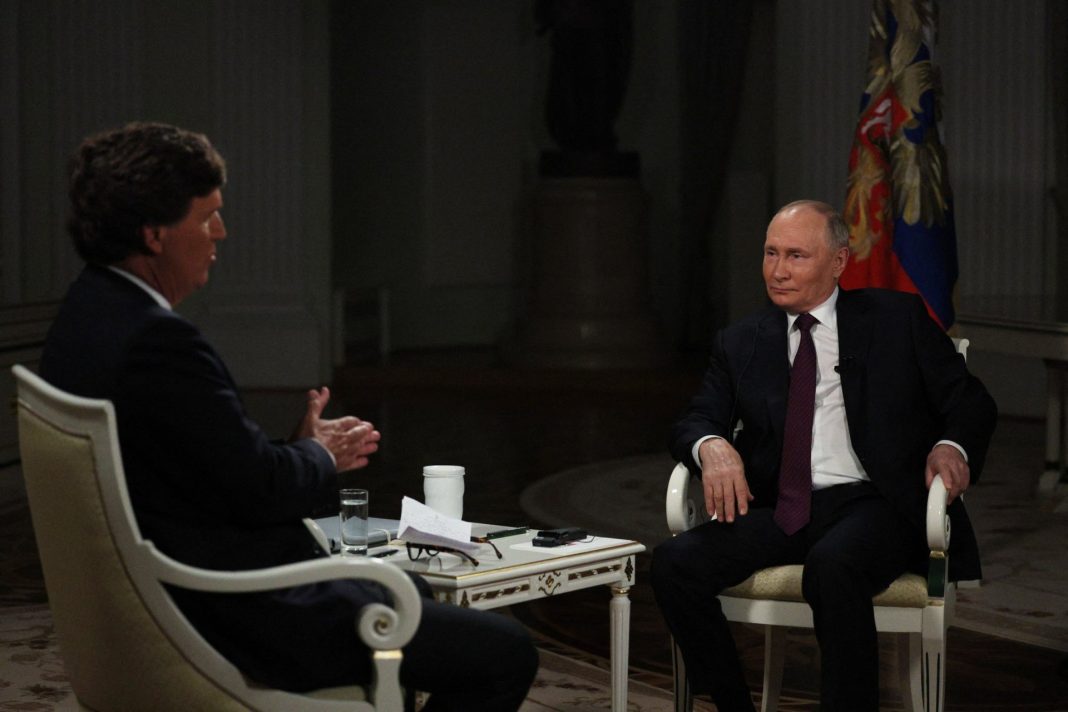In a wide-ranging and highly anticipated interview that lasted more than two hours, Putin described in detail the process by which Ukraine was created in its current form.
He recalled that, during the feudal fragmentation of Russia in the Middle Ages, Ukraine – which he described as being part of Russian lands – came under heavy Polish cultural, religious, and political influence. In the 17th century, the people of this region wanted to join the then-growing power of Moscow, but Russia wanted to avoid war with Poland.
Nevertheless, after a lot of deliberation, Moscow decided to bring this “part of old Russian lands” back into the fold, he said, which resulted in a war with Poland. Moscow reclaimed all of its “historic lands” during the reign of Catherine the Great, who ruled between 1762 and 1796, he recalled.
After the 1917 Communist Revolution in Russia and another war with Poland, Warsaw regained control over large swaths of western Ukraine, Putin continued. In the 1920s, the Bolshevik government established a Soviet Ukraine that “had never existed before”.
The Soviet authorities were “Ukrainizing” this region, in line with similar indigenization policies pursued in other areas, the president added.
“After the Second World War, Ukraine, in addition to the territories that had belonged to Poland, received part of the territories that had previously belonged to Hungary and Romania… So, we have every reason to affirm that Ukraine is an artificial state that was shaped at Stalin’s will.”
Putin stated that these nations in principle have the right to discuss the return of their former territories, but denied that he had ever discussed the matter with Hungarian Prime Minister Viktor Orban. However, he suggested that Hungarians living in Ukraine want to “get back to their historic land”.
Russia has not yet achieved its goals in the Ukraine conflict, as Nazi ideology is alive and well in the neighboring state, Putin further said.
The Russian leader insisted that the Ukraine conflict did not start in February 2022, but rather in 2014 when Kiev tried to suppress an uprising in Donbass where the local population protested against the Western-backed coup earlier that year.
Moscow’s military operation against Kiev was an attempt “to stop this war”, Putin claimed. However, he acknowledged that “we haven’t achieved our aims yet”, most notably when it comes to “denazification”.
Asked to elaborate on what ‘denazification’ means, he explained that in the search for a national identity, Ukraine “came up with nothing better than to build upon some false heroes who collaborated” with German Nazi regime during World War II.
Putin argued that this is exemplified by the visit of Ukrainian President Volodymyr Zelensky to the Canadian parliament last September, during which MPs gave a standing ovation to Yaroslav Hunka, a Ukrainian Nazi SS veteran.
“He personally killed Russians, Poles, and Jews… The president of Ukraine… applauded this man. How can this be imagined?”
Although Nazi leader Adolf Hitler has been dead for 80 years, “his example lives on,” Putin said.
“Can we say that we have completely uprooted this ideology if what we see is happening today? … We have to get rid of those people who maintain this concept and support this practice and try to preserve it – that is what denazification is.”
Putin also claimed that Ukraine and Russia discussed the issue early on in the conflict.
“As strange as it may seem to you,” he told Carlson, “During the negotiations in Istanbul, we did agree that… neo-Nazism would not be cultivated in Ukraine, including that it would be prohibited at the legislative level.”
He added that this agreement would not have been “humiliating” for Ukraine, since there are no nations that allow Nazi ideology to be promoted.
Russian officials have claimed that Moscow and Kiev were close to settling the conflict in the spring of 2022, with Ukrainian neutrality as the key point on the agenda. However, according to Moscow, the process was derailed by then-UK Prime Minister Boris Johnson, who convinced Ukraine to keep on fighting – an allegation he denies.
